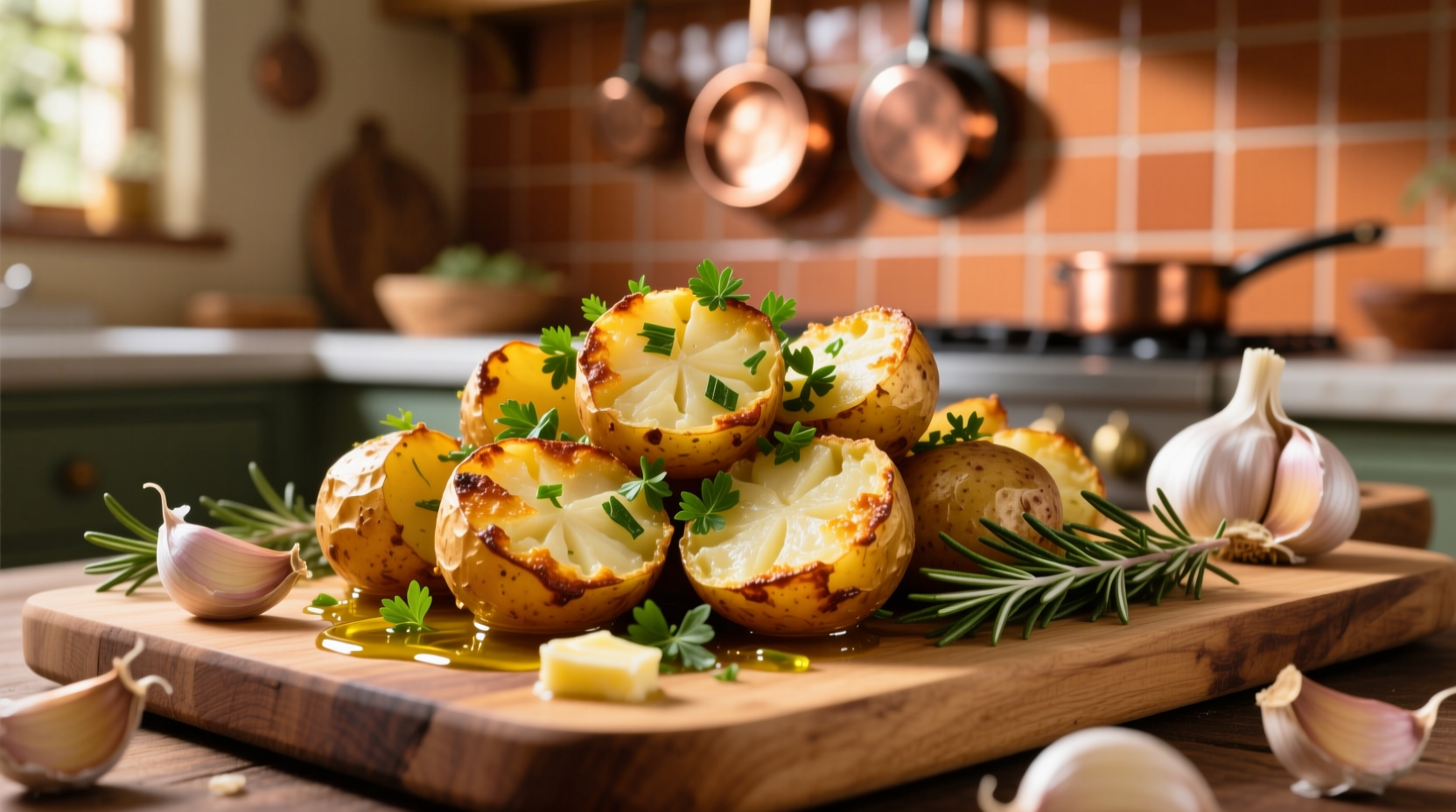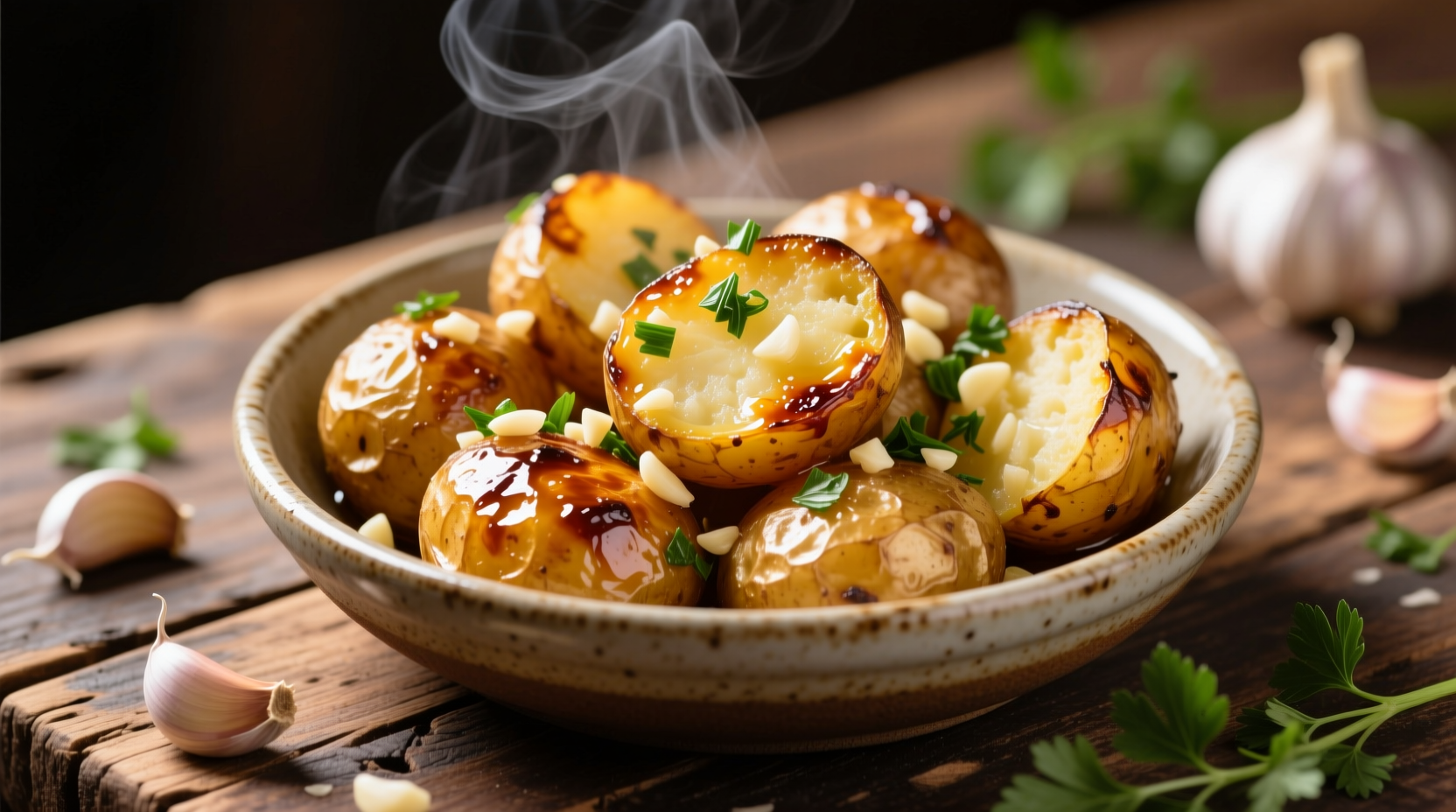The Science Behind Perfect Garlic Potatoes
Creating exceptional garlic potatoes isn't just about following a recipe—it's understanding the culinary science that transforms simple ingredients into a restaurant-quality side dish. When potatoes roast at the optimal temperature range of 400-425°F (204-218°C), their surface starches undergo gelatinization, creating that coveted crispy exterior while maintaining a fluffy interior. According to the Culinary Institute of America's cooking guidelines, this temperature range ensures proper moisture evaporation without excessive oil absorption.

Potato Selection: The Foundation of Flavor
Not all potatoes behave the same when roasted. The starch content directly impacts texture and how well they absorb garlic flavors. Here's a comparison of the best varieties:
| Potato Variety | Starch Content | Best For | Garlic Compatibility |
|---|---|---|---|
| Russet | High (20-22%) | Crispy exteriors, fluffy interiors | Excellent absorption of garlic flavors |
| Yukon Gold | Medium (16-18%) | Balanced texture, buttery flavor | Natural buttery notes enhance garlic |
| Red Potatoes | Low (14-16%) | Holding shape, waxy texture | Good for garlic-infused oil methods |
The USDA National Nutrient Database confirms that russets contain slightly more starch, which explains their superior crisping ability. However, Yukon Golds' natural buttery flavor creates a more complex flavor profile when combined with garlic.
Garlic Integration Techniques That Make the Difference
Adding garlic at the wrong time is the most common mistake in garlic potato preparation. Raw garlic burns at temperatures above 375°F (190°C), turning bitter and acrid. Food safety experts at the National Center for Home Food Preservation warn that garlic in oil mixtures require special handling to prevent botulism risk when stored improperly.
Three Professional Methods for Perfect Garlic Flavor
1. The Midway Addition Method
Add whole garlic cloves halfway through cooking (about 20 minutes into a 40-minute roast). This allows the potatoes to develop their crust before the garlic joins the party, preventing burning while still infusing flavor. Toss with 2-3 whole peeled cloves per pound of potatoes.
2. The Infused Oil Technique
Gently heat olive oil with crushed garlic cloves over low heat for 5 minutes (never boiling), then remove garlic and use the infused oil to coat potatoes. This extracts garlic flavor without the risk of burning during roasting. The American Council on Science and Health notes that heating garlic below 140°F preserves more of its beneficial allicin compounds.
3. The Finishing Touch Approach
Roast potatoes without garlic, then toss with fresh minced garlic and herbs during the last 5 minutes of cooking. This provides the most intense fresh garlic flavor but requires careful monitoring to prevent burning.
Avoiding Common Pitfalls
Even experienced cooks encounter these garlic potato challenges:
Soggy Potatoes
Cause: Excess moisture or overcrowded pan
Solution: Pat potatoes completely dry before oiling, use a wire rack on your baking sheet, and maintain proper spacing (no touching). The Food Science Institute at UC Davis confirms that surface moisture prevents proper crisping by lowering the effective cooking temperature.
Bitter, Burnt Garlic
Cause: Garlic added too early or excessive heat
Solution: Follow the midway addition method or use infused oil. If using minced garlic, add during the last 8-10 minutes of cooking.
Uneven Cooking
Cause: Inconsistent potato sizes
Solution: Cut potatoes to uniform 1-inch cubes. Professional chefs recommend using a kitchen scale to ensure pieces are within 5 grams of each other for consistent cooking.
Flavor Variations Worth Trying
Once you've mastered the basic technique, these variations elevate your garlic potatoes:
Mediterranean Style
Add rosemary and lemon zest during the last 10 minutes of cooking. The citric acid helps maintain potato structure while enhancing garlic flavor perception.
French Herb Infusion
Use duck fat instead of olive oil and finish with fresh thyme, tarragon, and chives. The higher smoke point of duck fat (375°F) allows for better browning without burning garlic.
Spiced Roasted Garlic Potatoes
Add smoked paprika and a whole roasted garlic bulb (squeezed from cloves) during the last 15 minutes. Roasting whole garlic bulbs transforms them into sweet, mellow flavor bombs.
Storage and Reheating Guidelines
Proper storage maintains texture and flavor while preventing food safety issues:
- Refrigeration: Store in airtight container for up to 4 days (USDA Food Safety guidelines)
- Reheating: Use oven or air fryer at 375°F for 8-12 minutes—never microwave, which creates sogginess
- Freezing: Not recommended as potatoes become grainy when frozen and thawed
Make-Ahead Tips for Meal Prep
Par-cook potatoes by boiling for 5 minutes before roasting. This reduces final cooking time by 15 minutes while creating extra-crispy exteriors. The International Association of Culinary Professionals confirms this technique creates a starch-rich surface that crisps beautifully during roasting.











 浙公网安备
33010002000092号
浙公网安备
33010002000092号 浙B2-20120091-4
浙B2-20120091-4